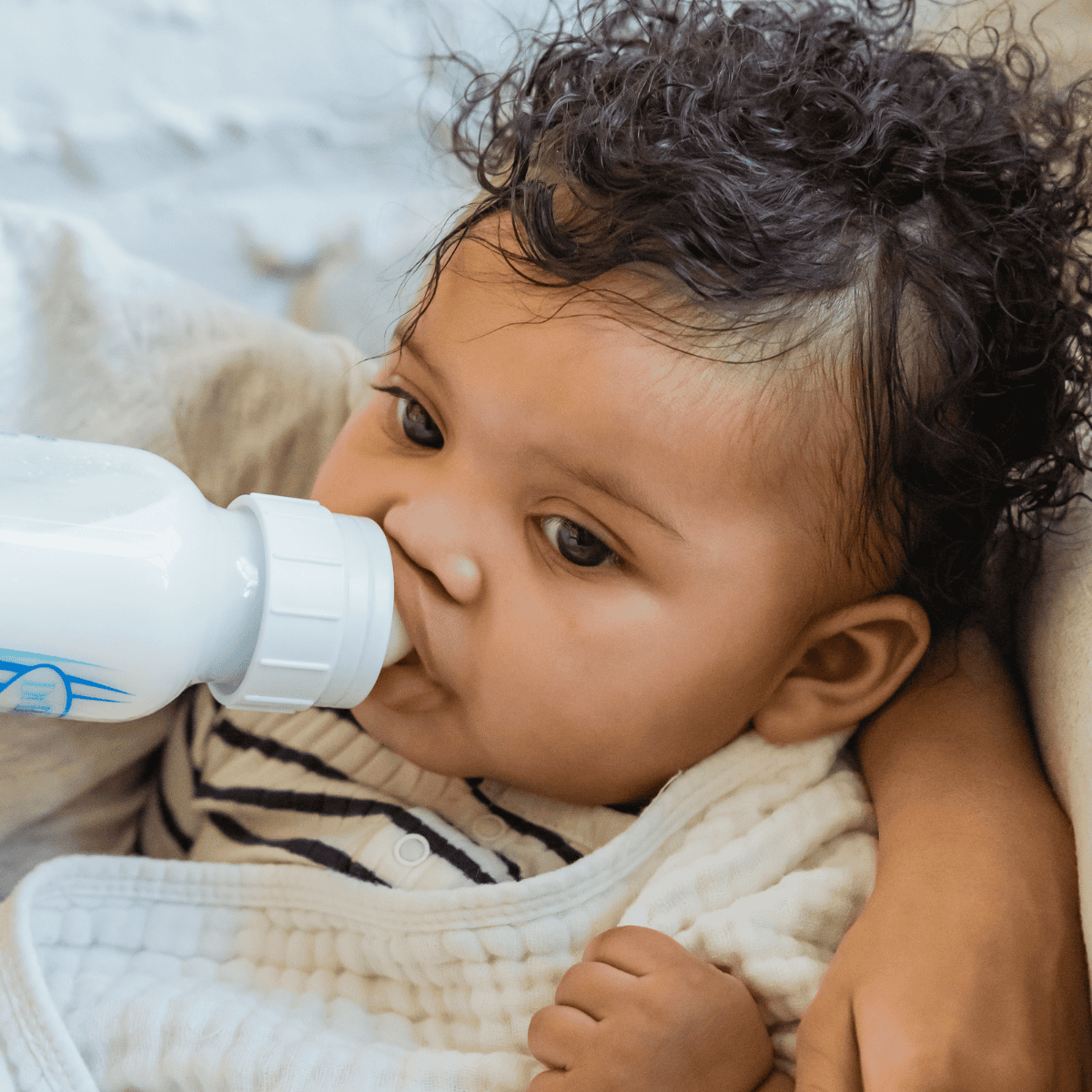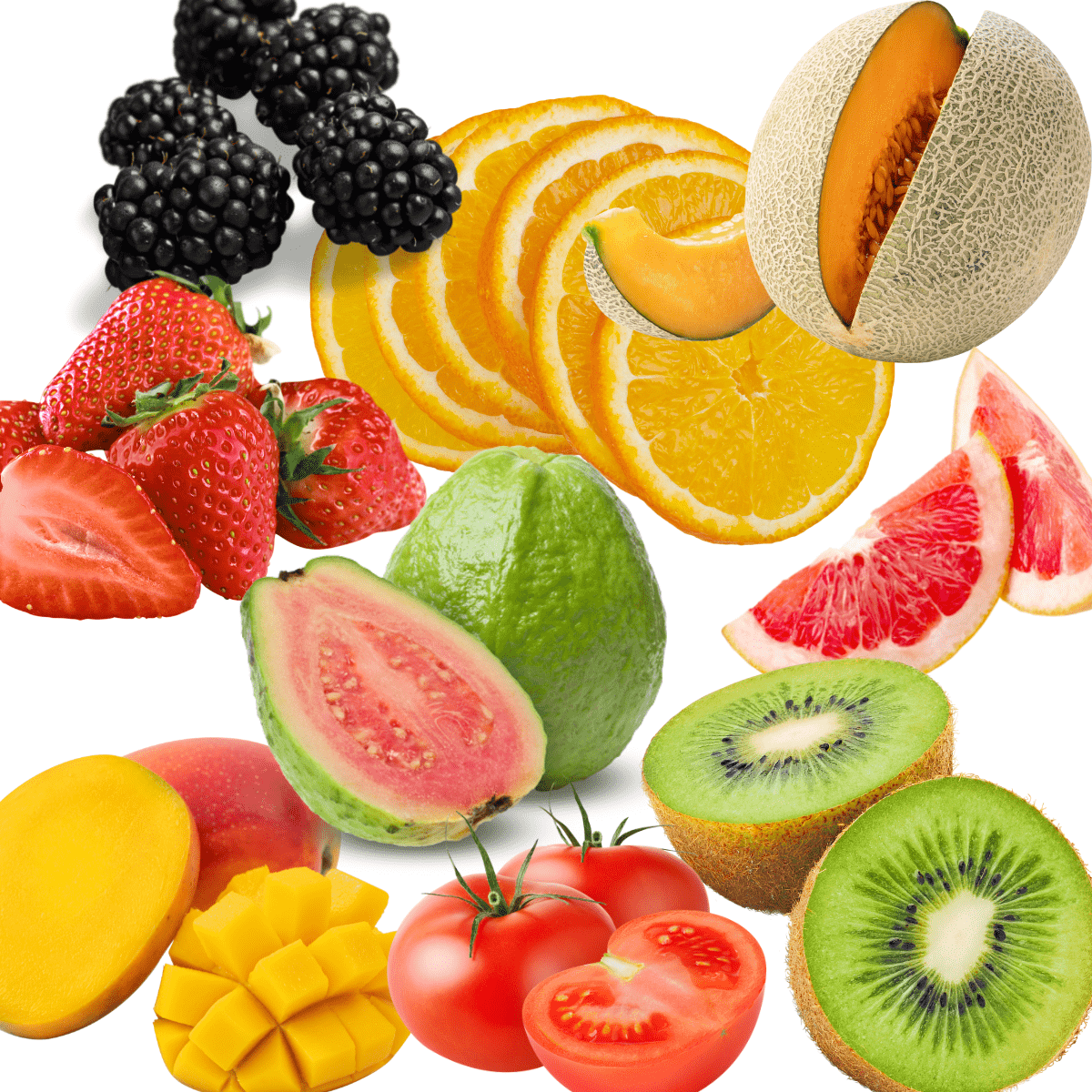Vitamin C Foods For Kids (and how much do they need?)
Oct 26, 2022, Updated Feb 16, 2024
This post contains affiliate links. Please see our disclosure policy.

There are lots of great vitamin C foods for kids! Vitamin C is a helpful antioxidant, it’s great for their skin, bones, and connective tissues, and it can help them absorb other important nutrients, like iron. And, as long as they’re getting enough each day, it can provide immune support.
But how much Vitamin C do kids need each day? Can they get enough from toddler-friendly foods, or should you be serving fortified orange juice on the daily? And what about Vitamin C supplements? In today’s post, I’ll get you the answers you need. And together, we’ll make sure they get the Vitamin C they need! (Orange you glad you found this article?! 😜)
Table of Contents
- What Is Vitamin C?
- What Does Vitamin C Do In The Body?
- How Much Vitamin C Do Kids Need Each Day?
- Recommended Daily Allowances (RDA) for Vitamin C in Kids
- Vitamin C: How Much Is Too Much For Kids?
- Vitamin C Is Easy To Get
- Vitamin C Foods For Kids
- When To Give Your Child A Vitamin C Supplement
- Can Vitamin C Supplements prevent a cold?
- Worried About Your Picky Eater? Start Here
What Is Vitamin C?
Also known as ascorbic acid, Vitamin C is something all kids (and adults) need. But, not all vitamins are the same. And they’re not all required in the same amounts. So let’s get specific!
Like most vitamins, Vitamin C is a water-soluble vitamin, which means it can be dissolved in water. Being water-soluble is a good thing because, once it’s been consumed, Vitamin C can be easily transported to the tissues in your child’s body that need it most. But, it’s less ideal in that it cannot be stored by your child’s body long-term. (Vitamins A, D, E, and K are the only ones that are fat-soluble instead of water-soluble. They can be stored in the liver and fat tissues in the body for longer-term use!) Vitamin C also can’t be produced by the body—we all need to get our Vitamin C from food.
This lack of long-term storage paired with the fact that the body can’t produce Vitamin C means your child needs to get enough of this vitamin every day through food to be sure there’s enough in their body at all times to go around.

What Does Vitamin C Do In The Body?
When you think of Vitamin C, you probably think of something that you take or try to get more of when you have a cold, right? Well, there’s a good reason for that! Vitamin C does help give us more immune support. But, it does a lot more than that, too!
Vitamin C…
- Is an antioxidant
- Helps maintain our skin, bones, and connective tissues through something called collagen synthesis
- Provides immune support (You knew this already, didn’t you?!)
- Increases our ability to absorb iron (Fun fact: If you’ve been told to take iron supplements with a Vitamin C supplement, this is why!)
It’s a great idea to make sure your family is getting enough Vitamin C in their diets. But, it’s not something you need to stress about too much. We’re about to get into how much Vitamin C your child needs—and how to get it into them. And as you’ll see, it’s super doable!
How Much Vitamin C Do Kids Need Each Day?
When we talk about how much of a vitamin or mineral a child or adult needs, we dietitians and health professionals tend to drop all kinds of acronyms, like RDA, AI, and UL. These are called ‘Dietary Reference Intakes’ and they help determine how much of everything individuals get or should be getting…but, if you’re not familiar with them, they can be confusing, too!
So before we talk about Vitamin C requirements specifically, let’s clear these up and make sure you and I are for sure on the same page.
RDA: Recommended Dietary Allowance
The average daily intake you need to meet the requirements for any given nutrient. This number will be accurate for up to 98% of people you’d describe as ‘healthy.’
AI: Adequate Intake
Think of this number as what’s “enough” based on either studies or approximations. This is based on studies or approximations of what appears to be adequate in healthy populations. AI is used when there is not enough information for an RDA.
UL: Tolerable Upper Intake Level
This is the highest amount of a nutrient you can likely consume without negative health risks. (You’re good if you get this amount of a given nutrient or less!)
Now, don’t get me wrong, these terms are all scientifically useful in determining optimal vitamin and mineral intake. But you don’t need to remember them all! I mostly want you to know the RDA (the minimum amount of Vitamin C they need each day) and the UL (how much is too much).
Recommended Daily Allowances (RDA) for Vitamin C in Kids
According to the National Institutes of Health’s Office of Dietary Supplements, these are the minimum amounts of Vitamin C your child will need to consume each day, based on their age:
| Child’s Age | Vitamin C Recommended Daily Allowance (RDA) |
| 0-6 Months | 40 mg of Vitamin C |
| 7-12 Months | 50 mg of Vitamin C |
| 1-3 Years | 15 mg of Vitamin C |
| 4-8 Years | 25 mg of Vitamin C |
Vitamin C: How Much Is Too Much For Kids?
The numbers we’ve listed above are Recommended Daily Allowances—they’re the minimum amounts of Vitamin C most children need for optimal health. But is there such thing as too much Vitamin C? In short, yes, there is such thing as too much Vitamin C—also known as Upper Limits of Vitamin C, which we’ve sourced from the National Institutes of Health’s Vitamin C Fact Sheet for Consumers:
| Child’s Age | Upper Limit (UL) for Vitamin C |
| 0-12 Months* | No established UL of Vitamin C |
| 1-3 Years | 400 mg of Vitamin C |
| 4-8 Years | 650 mg of Vitamin C |
*Babies under 1 year of age get all the Vitamin C they need from formula or breastmilk when consuming about 20 oz or more daily.

Side effects of having too much Vitamin C in children are digestive discomfort, diarrhea, and nausea. And, they can potentially develop kidney stones. But “too much” is a LOT—the upper levels you see here are much higher than the recommended daily allowances listed above. And, because Vitamin C is water-soluble, the excess your child consumed will get excreted in their urine. So if your child gets more than the RDA of Vitamin C—as long as it’s not a TON more in a short period of time—you shouldn’t need to worry.
And if your child is over 12 months old, eats fruit and veggies with Vitamin C daily, and takes a multivitamin with vitamin C, that’s okay. Just double-check that they’re staying below those upper limits. (They likely will be!)
Vitamin C Is Easy To Get
The good news is that these numbers are extremely easy to reach with a diet that’s even somewhat balanced and includes some kind of daily fruit and veggies. Breastfed and formula-fed babies get enough Vitamin C from breastmilk and/or formula, so there’s no need to supplement there.
You may need to be intentional about your child getting enough Vitamin C if you have a picky eater—especially if they’re not big on fruits and veggies. But overall, Vitamin C deficiencies are pretty rare, and that’s because this vitamin is so readily available in so many foods.
Vitamin C Foods For Kids
By now, you know that your child needs Vitamin C and that they need to get it from food. But what does 25 or 50 mg of Vitamin C look like in real life?! Let’s get you some examples.
And remember, a 1 to 3 year old only needs 15 mg per day; a 4 to 8 year old needs 25 mg per day.

Fruits with Vitamin C
- Oranges (30 mg per half orange)
- Grapefruits (38.4 mg per half grapefruit)
- Guava (125.6 mg per fruit)
- Persimmons (16.5 mg per fruit)
- Blackberries (30.2 mg per 1 cup)
- Strawberries (84.7 mg per 1 cup)
- Cantaloupe (57.3 mg per 1 cup)
- Kiwi (40 mg per ¼ cup)
- Mangos (11 mg per ¼ cup)
- Tomatoes (20.4 mg per 1 cup cherry tomatoes)
Vegetables with Vitamin C
- Bell peppers (45 mg per ¼ cup)
- Broccoli (30 mg per ¼ cup)
- Cauliflower (25 mg per ½ cup)
- Brussels sprouts (74.8 mg per 1 cup)
Other Sources of Vitamin C
- Fruit juices, like orange juice (50 mg per ½ cup)
- Potatoes (42 mg per medium potato)
- Foods fortified with Vitamin C
- Vitamin C Supplements
Are any of these vitamin C foods for kids ones that your little one eats regularly?
When To Give Your Child A Vitamin C Supplement
Because Vitamin C is in so many foods, it’s usually pretty easy to meet their recommended daily allowance of Vitamin C with food. Babies get enough from breastmilk or formula alone, and once they start solids or purees, half a cup of steamed veggies does the trick. Toddlers can meet their RDA with half an orange or half a cup of mango. And preschoolers only need a little kiwi or a quarter cup of peppers and dip to do it! So, in most cases, a Vitamin C supplement isn’t necessary. But there are a few instances where it might be.
Consider a Vitamin C Supplement If…
- Your child is a severely picky eater
- Your child has been diagnosed with digestive issues
Vitamin C supplements come in both gummy or liquid forms, and Vitamin C is usually included in multivitamins. Just remember to always consult with your child’s pediatrician before you begin supplementing their diet, and whenever you think they may have a need for additional Vitamin C!
Related: The Best Multivitamins for Toddlers

Can Vitamin C Supplements prevent a cold?
It is well established in the research that taking vitamin C supplements will not prevent a cold. It is possible that regular vitamin C supplementation may slightly shorten the duration of a cold. That being said, there are multiple benefits from the foods that naturally contain vitamin C, and I would still focus on those first.

Worried About Your Picky Eater? Start Here
If you’re here learning about Vitamin C because your little one is picky—especially when it comes to fruits and veggies!—you’re in the right place. As both the mom to a previously very picky eater AND a Registered Dietitian who works with picky eaters, I know your stress intimately and oh-so personally. And I want to help you through it!
Free Picky Eater Starter Guide
In this downloadable guide, I hold your hand through the first 4 steps you need to take to move towards enjoying happier mealtimes—and getting them to eat more foods! Don’t do another day of picky eating without it.
Disclaimer: this post is for informational purposes only and should not be used as a substitute for a consultation with your child’s healthcare provider.












